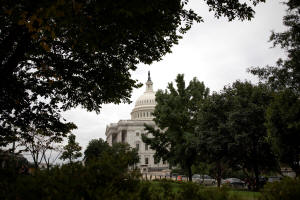Moderates fleeing U.S. House, setting stage for more Washington gridlock
 Send a link to a friend
Send a link to a friend
 [September 14, 2022]
By Joseph Ax and Jason Lange [September 14, 2022]
By Joseph Ax and Jason Lange
(Reuters) - Moderate members of the U.S.
House of Representatives are leaving office at twice the rate of their
more partisan peers this year, a Reuters analysis found, likely
deepening Washington gridlock during President Joe Biden's next two
years in office.
The number of incumbent House members retiring or who lost a party
nomination contest is at a three-decade high after a once-a-decade
redistricting process that eliminated more than a dozen of the country's
dwindling number of competitive districts.
Now all 50 states have finished their nominating contests, 13 of
Congress's 50 most centrist members - about one in four - did not seek
reelection or lost their primary, ensuring they will leave office at
year's end. By comparison, only one-eighth of other incumbents will not
appear on the Nov. 8 ballot, with the majority running in politically
safe districts.

The candidates who take their place won't be known until after the
midterm election, when Republicans are favored to win a majority in the
House, but in many cases their potential successors show signs of being
further from the middle.
One driving factor is gerrymandering, the practice by which lawmakers in
states controlled by a single party manipulate redistricting to create
politically safe House districts. Another is former President Donald
Trump, who worked to push from office Republicans who voted to impeach
him following the Jan. 6, 2021, attack on the U.S. Capitol.
"The lack of competitive seats has helped accentuate that trend," said
Peter Meijer, a Michigan Republican who voted to impeach Trump and lost
his primary to a far-right challenger. "It's really easy from the safety
of a deep red or a deep blue seat to cast stones."
'MORE GRIDLOCKED'
The Reuters analysis employed a measure developed by political
scientists known as DW-Nominate, which scores every representative's
voting record to determine the most moderate members.
The share of moderates heading for the door this year is unusually high.
For elections held between 2012 and 2020, only about one in eight
moderate incumbents opted not to seek reelection or lost their
primaries.
The result could accelerate a decades-long trend that has seen the House
grow increasingly polarized, lengthening the odds of bipartisan efforts
to address thorny challenges such as shoring up Social Security and
Medicare, the welfare programs for seniors that face severe fiscal
challenges.
"Politics is going to be more gridlocked," said Doug Spencer, an expert
on elections and redistricting at the University of Colorado.

The narrowly Democratic-controlled Congress over the past two years
passed a $1 trillion infrastructure bill and its first gun control bill
in decades in bipartisan votes. But Democrats also passed a $1.9
trillion COVID relief bill in March 2021 and $430 billion climate and
drug pricing bill using a parliamentary maneuver known as reconciliation
that let them bypass Republican objections in the Senate.
Whichever party is in control, the Congress that convenes on Jan. 3 will
need to make prompt decisions on fiscal matters, including raising the
U.S. government's borrowing authority beyond its current $31.4 trillion
limit, which it is expected to reach early next year.
Without a debt limit increase, Washington would face a potential default
that would shake the global economy.
[to top of second column]
|

The U.S. Capitol during morning hours,
on Capitol Hill in Washington, U.S., September 8, 2022. REUTERS/Tom
Brenner/File Photo

GERRYMANDERING
In interviews, several moderates leaving office said their decisions
were motivated by factors including gerrymandering, which has made
it less politically valuable to appeal to voters from both major
parties.
More than four-fifths of the House's 435 districts as they now stand
were won by Biden or Trump by more than 10 percentage points in
2020, making it harder for a lawmaker from the other party to mount
a viable campaign. That drove some members of Congress, such as
Tennessee Democrat Jim Cooper, to choose not to seek reelection at
all.
Tom Suozzi, a moderate Democrat from New York who opted to run for
governor rather than seek re-election, said gerrymandering was
producing more ideologically radical caucuses.
"The only way to lose the safe seat is to lose the primary," he
said. "Republicans pander to the far right, Democrats pander to the
far left. And that's why there's very little moderation or
compromise available."
Suozzi has been a member of the Problem Solvers Caucus, a bipartisan
group of moderate lawmakers. The progressive Democrat running in the
race to replace him, Robert Zimmerman, has criticized the group for
being too close to Republicans.
Stephanie Murphy, a Florida Democrat and a leading centrist, is
retiring from the House at age 43, saying she wants to spend more
time with her young children. She said she believes both parties
have become less tolerant of dissent.
"The reason, I think, you see more attrition among moderate members
is they take incoming from both sides," she said, adding that she
faced attacks from both liberal and conservative groups in previous
campaigns.

Republican control of the House would create divided government,
with Biden's Democrats having a harder time advancing legislation.
The push by Trump-backed candidates echoes the 2010 midterms, when
small-government Tea Party activists drove massive Republican gains
in Congress while moving the party further to the right.
With Democrat Barack Obama in the White House, the two parties
courted fiscal disaster when they nearly allowed the federal
government to default on its debt payments, prompting the first-ever
downgrade to U.S. sovereign debt and shaking financial markets.
Cheri Bustos, an Illinois Democrat and a leading centrist who is
retiring this year, said the Jan. 6 attack only deepened distrust
between the parties, with many Democrats unwilling to work with
Republicans who voted against certifying Biden's victory based on
Trump's false claims of fraud.
"We've got to get something done, and that requires us to work with
people who you don't always agree with their votes," she said.
(Reporting by Joseph Ax in New York and by Jason Lange and Richard
Cowan in Washington; Editing by Scott Malone and Daniel Wallis)
[© 2022 Thomson Reuters. All rights
reserved.]
This material may not be published,
broadcast, rewritten or redistributed.
Thompson Reuters is solely responsible for this content.
 |